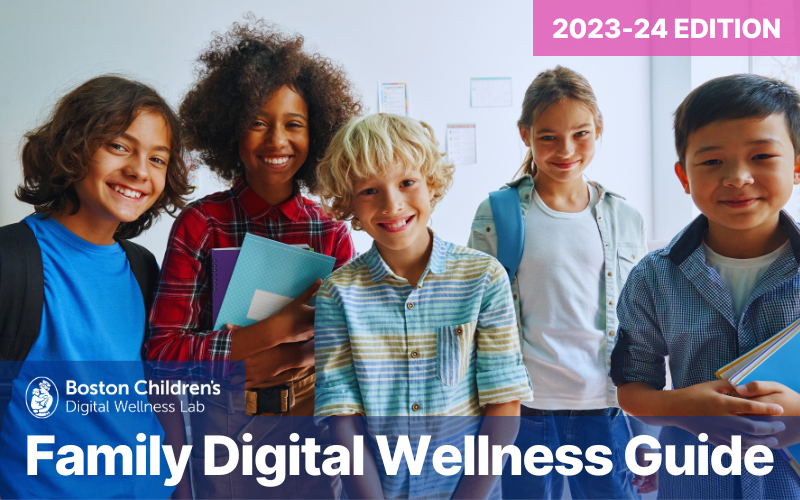Digital Wellness Lab Clinical Research Specialist Nicole Powell joins with experts and youth to promote connection and wellness.
Search press:
-
Press Release Healey-Driscoll Administration Hosts First-Ever Healthy Youth Summit
Get the whole story at mass.gov.
-
Addicted to your phone? How you can stop yourself from checking it hundreds of times a day
Dr. Michael Tsappis of the Clinic for Interactive Media and Internet Disorders discusses the idea of addiction regarding disordered technology use.
Get the whole story at WSB-TV.
-
UToledo panel discusses youth mental health crisis
Founder of the Digital Wellness Lab Dr. Michael Rich joins an expert panel discussing youth mental health.
Get the whole story at WTVG.
-
Why Does Big Bird Look So Sad?
Dr. Michael Rich, the director of the Digital Wellness Lab, comments on the solid educational work done by the Sesame Workshop, a Lab collaborator.
Get the whole story at New York Times.
-
5 tips for raising healthier, screen-balanced kids according to the ‘media-trician’
Dr. Michael Rich of the Digital Wellness Lab provides an in depth interview covering advice on providing a balancing digital upbringing for kids.
Get the whole story at Boston Globe.
-
Schools, state legislature unsubscribing to student cell phone use
Digital Wellness Lab Research Director Dr. David Bickham discusses balancing upsides such as connectivity with downsides such as distraction in phone use at school.
Get the whole story at Nebraska Public Media.
-
Perspectives Series Continues with March 24 Discussion on Youth Mental Health
An announcement of the participation of the Digital Wellness Lab’s Dr. Michael Rich in a panel to discuss youth anxiety and depression.
Get the whole story at The University of Toledo.
-
Excessive phone and screen use tied to manic symptoms for one group, study finds
Dr. Keneisha Sinclair-McBride, Consulting Psychologist with the Digital Wellness Lab, encourages adults to lean about the apps and content kids in their lives are using and consuming.
Get the whole story at Fox News.
-
What Is Character.AI? Everything to Know About the Role-Playing AI Tool
Character.AI’s participation in the Inspired Internet Pledge is highlighted.
Get the whole story at CNET.
-
How to spot doomscrolling and guide teens toward balance
Digital Wellness Lab founder Dr. Michael Rich focuses on the importance of self-regulation in media consumption.
Get the whole story at Verizon.
We believe that by following the science, we can create an empathetic and respectful world in which our kids can grow up healthy, smart, and kind.

Subscribe to our email newsletter to receive Lab news & insights
©2025 Boston Children’s Hospital. All rights reserved. Terms of Use Privacy Policy






